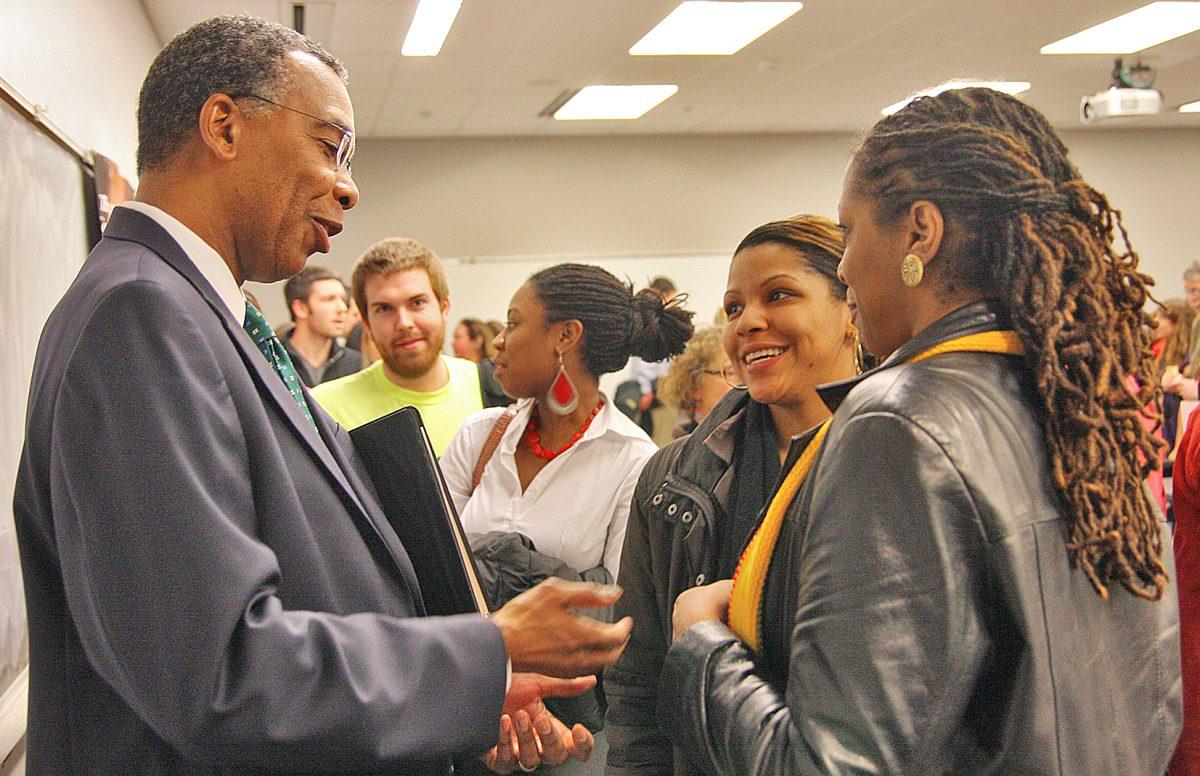
David Mabe
Peace Corps director comes to campus, speaks about student engagement
Russell Witham, Executive Editor
The director of the Peace Corps, Aaron Williams, visited the SAS Building at N.C. State Thursday to talk to students about the importance of service and the ways in which they can help their country.
The classroom where the presentation took place was packed to the brim with people, seeping more than 100 students, faculty and returned Peace Corps volunteers into the hallway outside the room as they attentively listened to the director, a thin and tall man in a navy-blue suit who has several grey hairs peering through his short black hair.
Beginning with a short video about the foundation of the Peace Corps in 1961 under the direction of President John F. Kennedy and its first director, Kennedy’s brother-in-law, Sergeant Shriver, the presentation culminated in a speech and question-and-answer session by Williams.
He grew up on the South Side of Chicago with different goals in mind than a life of service. “When I was growing up on the South Side of Chicago, I aspired to be a high school teacher,” Williams said.
He said that although the experience “changed my life entirely,” his family was hesitant about his decision to join the Peace Corps, especially considering his status as the first in his family to graduate from college — Chicago State University.
But his mother encouraged him to join with the thought that it would change his life. According to Williams, it did, and gave him invaluable skills at a young age. “It was the opportunity to work in a leadership position,” he said.
Williams worked as a teacher trainer in the Dominican Republic, educating rural teachers who themselves only possessed a fifth- or sixth-grade education.
For them, he said it was a serious commitment: “They gave up their summers and weekends to participate in this program.”
He said, “You see that what you do counts, so you can be very serious about it.” A theme he addressed again during the event, as he talked to the crowd about the importance of service and reiterated the need for all Americans to heed President Barack Obama’s “call to service.”
In all, Williams said most volunteers come back with a relatively similar experience. “They’ll tell you that this experience transformed them; they saw themselves in a different way,” he said.
He added that in addition to the leadership and language training — Williams himself was taught Spanish through the Peace Corps despite his admittedly recalcitrant attitude toward learning it initially — “it provides you an opportunity to see yourself in a different context … it’s just a unique experience.”
The experience has been unique for many Americans, as the Peace Corps has had more than 200,000 volunteers during its almost 50 years in existence and operates in 76 countries worldwide today — particularly in areas where hardship and poverty are profound.
According to Williams, Congress and Obama, who appointed Williams to his post last year, are very encouraged by the work of the Peace Corps and hope to see its expansion.
“They’ve given us the resources to put us on a strong trajectory toward growth,” he said.
Williams said he hopes to double the size of the Peace Corps through two paths. “We’re going to build on existing programs in countries where we already have [them],” he said. And the Peace Corps also plans to add two new countries, Sierra Leone and Indonesia, the latter at the behest of the president — Indonesia was one of Obama’s childhood homes.
Williams said it can’t come at a better time as bipartisan Congressional support has increased the Peace Corps’ budget to $400 million and “Americans are stepping up; they have an interest in serving.”
Applications to volunteer for the Peace Corps this year are up 18 percent. The director encouraged students to discern whether a life of public service would be a rewarding experience for them personally and aide them in seeing the need for everyone to be a global citizen.
Despite the potential rewards, some returning volunteers spoke of the difficulties the service can bring. Marques Anderson, a returned Peace Corps volunteer who served in Nicaragua and N.C. State’s Peace Corps recruiter, said, “I made [the mistake] of thinking I was going to change the entire country of Nicaragua.” Although he said the experience was very rewarding, it is difficult.
Terrie Morris, another returned volunteer from the Raleigh area who served in southwest China, said that since her return she was struggling to “try to get a new direction.”
Students’ reactions were primarily positive, though. Wesley Jones, a sophomore in international business, said he has been really interested in the Peace Corps and was impressed with Williams’ speech. “I wanted to find out more than what is on the Web site,” he said.
Myong Ju Kim, a graduate student in economics, said she “was interested in joining Peace Corps.” And that in order to see the world differently, “it was time for [her] to think about it seriously.”
Williams said the insights the Peace Corps can provide are essential for a global career.
“If you want to live in a different culture — really live — the Peace Corps offers that opportunity,” he said.